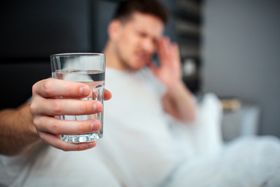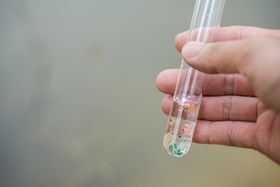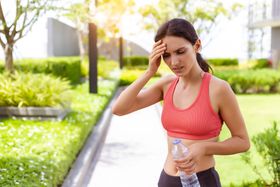4 Caffeine-Free Alternatives to Energy Drinks for a Natural Boost
Can natural ingredients provide a sustained energy lift minus the crash? We explore the caffeine-free alternatives to energy drinks.
Updated February 3, 2025

Do you grab an energy drink from the fridge when rushing to work every morning? Or worse, do you grab a few to have with you during the day? You may get away with caffeine overuse for a while...until suddenly you don't.
You're basically rolling the dice with your health by drinking large amounts of them. Studies show that they can cause permanent changes in the heart muscle. [1,2] Energy drinks can even corrode your teeth. [3]
We're here to tell you there are healthier and more sustainable ways to power through your days without the wild highs and lows. No crashes, no side effects—just focused fuel to tackle your day.
4 Caffeine-Free Alternatives to Energy Drinks
Here are four caffeine-free alternatives to energy drinks to get your energy levels up:
- Electrolyte water
- Kombucha
- Smoothies
- Coconut water
When Is Caffeine Detrimental?
Caffeine can become detrimental in a few ways:
- Dosage: The FDA considers up to 400mg—four cups of coffee—of caffeine daily safe, so exceeding this amount causes headaches, insomnia, and muscle tremors. [4]
- Individual Sensitivity: Even moderate amounts of caffeine may cause jitters, anxiety, or trouble sleeping if you're sensitive to it.
- Timing: You could disrupt your sleep if you have too much caffeine close to bedtime, even if you're not sensitive.
- Health Conditions: If you have diabetes, osteoporosis, or hypertension, caffeine can aggravate the symptoms. [5] You should consult your doctor about proper intake so you don't make matters worse.
1. Electrolyte Water
Long-distance runners, you'll like this one.
To complete your runs efficiently your body needs to be able to hit the required zones and efforts. You need sustained energy, and caffeine can't give it to you. [6] You can only get a temporary boost, followed by a crash.
- Potassium
- Magnesium
- Calcium
- Sodium
- Chloride
You lose all of these minerals through sweat, but you can quickly replace them with MAYU Essential Mineral Drops. With each bottle, you get a 30 ml of concentrated minerals—enough for over 15 gallons of water. Plus, the 75 other ionic trace elements help you quickly absorb that post-workout meal.
The formula is NSF certified. It has undergone thorough testing and evaluation so you can be sure it's free from contaminants and chemicals. Your satisfaction is our priority. Not happy with your purchase? Return within 30 days for a free refund.
2. Kombucha
Kombucha is a fermented probiotic beverage made of a mixture of brewed tea and yeast. [7] It also has a symbiotic colony of bacteria, all working together to produce organic enzymes and vitamins. The fermentation gives it a fizzy and fruity flavor, detoxifies the body, and boosts energy levels.
It's a gut-healthy, caffeine-free alternative to energy drinks. It helps the body maintain microorganisms that blanch the stomach flora. You can buy it at most grocery stores, but you can also make it at home if you're feeling adventurous.
3. Smoothies
Homemade smoothies are a convenient way to get your daily dose of nutrients and the boost you need to power through your day. Mix and match different fruits, veggies, oats, peanut butter, milk, and more to create a delicious and nutritious alternative to energy drinks that suits your tastebuds, be it sweet, fruity, or savory.
They provide a source of
- Fiber that plays a vital role in maintaining healthy bowels and controlling blood sugar.
- Vitamins that are essential for regulating the immune system and energy levels.
- Protein can help you feel satisfied longer, build muscle, and even speed recovery after exercise or injury.
4. Coconut Water
This slightly sweet, nutty-flavored drink is low in calories, free of fats and cholesterol, and packed with essential minerals, including high levels of potassium.
Not only is it hydrating, but it's also a natural caffeine-free source of zest that won't trigger feelings of anxiety, jitteriness, and nervousness like energy drinks do.
You can even blend it with fruits to make a delicious smoothie. When choosing coconut water, we suggest you check the label and, where possible, choose a brand that has no added sugar. This way, you'll get the most health benefits out of your beverage.
Keep Your Energy Levels Up Without Caffeine
While energy drinks provide a quick jolt, nutrient-dense foods, herbs, and hydration are caffeine-free, longer-lasting alternatives that won't cause crashes or side effects.
Ditch the chemical-laden options and give your body what it truly needs to thrive - whole foods, herbs, and lifestyle habits from nature's pharmacy. Your mind and body will thank you for boosting your vitality naturally.
References:
- A. Costantino et al., “The Dark Side of energy drinks: A comprehensive review of their impact on the human body,” Nutrients, vol. 15, no. 18, p. 3922, Sep. 2023, doi: 10.3390/nu15183922. Available: https://pmc.ncbi.nlm.nih.gov/articles/PMC10535526/
- C. Munteanu, “Long-term consumption of energy drinks induces biochemical and ultrastructural alterations in the heart muscle,” The Anatolian Journal of Cardiology, Jan. 2018, doi: 10.14744/anatoljcardiol.2018.90094. Available: https://pmc.ncbi.nlm.nih.gov/articles/PMC6280269/
- J. Silva et al., “Influence of energy drinks on enamel erosion: In vitro study using different assessment techniques,” Journal of Clinical and Experimental Dentistry, pp. e1076–e1082, Jan. 2021, doi: 10.4317/jced.57788. Available: https://pmc.ncbi.nlm.nih.gov/articles/PMC8601704/
- “Spilling the Beans: How Much Caffeine is Too Much?” Available: https://www.fda.gov/consumers/consumer-updates/spilling-beans-how-much-caffeine-too-much
- C. Hou et al., “Medical conditions associated with coffee consumption: Disease-trajectory and comorbidity network analyses of a prospective cohort study in UK Biobank,” American Journal of Clinical Nutrition, vol. 116, no. 3, pp. 730–740, Jul. 2022, doi: 10.1093/ajcn/nqac148. Available: https://www.ncbi.nlm.nih.gov/pmc/articles/PMC9437992/
- A.-L. Tardy, E. Pouteau, D. Marquez, C. Yilmaz, and A. Scholey, “Vitamins and Minerals for energy, fatigue and Cognition: A Narrative review of the biochemical and Clinical evidence,” Nutrients, vol. 12, no. 1, p. 228, Jan. 2020, doi: 10.3390/nu12010228. Available: https://www.ncbi.nlm.nih.gov/pmc/articles/PMC7019700/
- R. Massoud, R. Jafari, and K. Khosravi-Darani, “Kombucha as a Health-Beneficial Drink for Human health,” Plant Foods for Human Nutrition, vol. 79, no. 2, pp. 251–259, Apr. 2024, doi: 10.1007/s11130-024-01169-8. Available: https://pubmed.ncbi.nlm.nih.gov/38602651/
Disclaimer: The information published by MAYU Water is not a substitute for the expert knowledge, advice, and recommendations of trained professionals. We strongly recommend consulting with industry experts and primary or scientific sources before making any health, research-related, or other important decisions.
















































